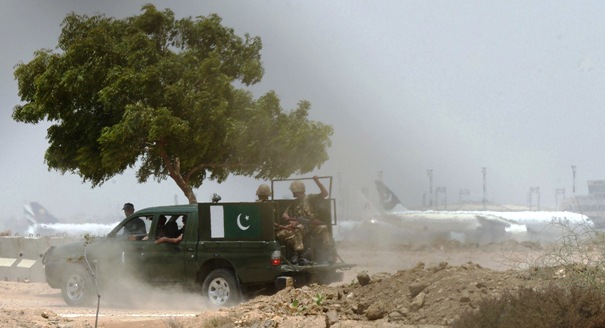The Pakistani Taliban, formally known as Tehreek-i-Taliban Pakistan, has claimed responsibility for a series of armed attacks on a Karachi Airport carried out on June 9 and 10. According to the information provided by the Pakistani authorities, it is believed that some of the 10 terrorists killed over the course of the attacks were ethnic Uzbeks (7 terrorists were killed in a shootout with the Pakistani military, and the other three blew themselves up).
However, so far, there is not enough information to determine conclusively whether these Uzbeks indeed belonged to the so-called Islamic Movement of Uzbekistan (IMU). The area to the north of the Pakistani capital between Islamabad and Chitral, in the direction of the Chinese border, is densely populated with the descendants of refugees from Central Asia, whose ancestors fled their homes almost 100 years ago, in the 1920’s. They look very similar to Uzbeks, and, in light of the fact that this area is controlled by the Pakistani Taliban, their involvement in the Karachi airport attacks is quite possible.
But, even if the terrorists happen to be ethnic Uzbeks, this does not automatically make them IMU members. Today, the IMU is more of a mythical than real structure that acts independently of the Taliban or functions as an Al Qaeda branch. Central Asian natives are still part of both Pakistani and Afghan Taliban factions (the Haqqani network or Mullah Omar group), and there have been no recent assaults or terrorist attacks in the region specifically tied to the Islamic Movement of Uzbekistan. According to informed sources in Afghanistan, the non-Pashtun militants (Uzbeks, Tajiks, and others) that remain in Afghanistan are under control of the Afghan Taliban. The Taliban helps them travel from North Waziristan, where their training camps are located, to Afghanistan’s northern provinces.
Meanwhile, many Central Asian analysts believe the IMU to be a real force that threatens the countries in the region. They think that the IMU will move out of the shadows as soon as the American troop withdrawal weakens the Afghan central government. Moreover, a conspiracy theory advanced by some analysts holds that the IMU is actually controlled by Uzbek special services, which are using the threat of attacks by Islamic militants as a pretext for cracking down on the civil society inside Uzbekistan and persecuting any activism on the part of observant Muslims.
The theories notwithstanding, we see no surge in terrorist activity along the Afghan borders with Central Asian countries so far, although it was expected in connection with the impending Coalition troop withdrawals. The skirmishes at the Afghan-Turkmen border that claimed the lives of three Turkmen border guards are a notable exception. But according to some local reports, these incidents appear to be conflicts between Afghan drug traffickers and their Tukrmen counterparts.
However, after the second round of the Afghan presidential elections scheduled to take place on June 14, terrorist activity at the country’s northern borders is likely to increase.
Arkady Dubnov is a political analyst and an expert on Central Asia.




.jpg)
